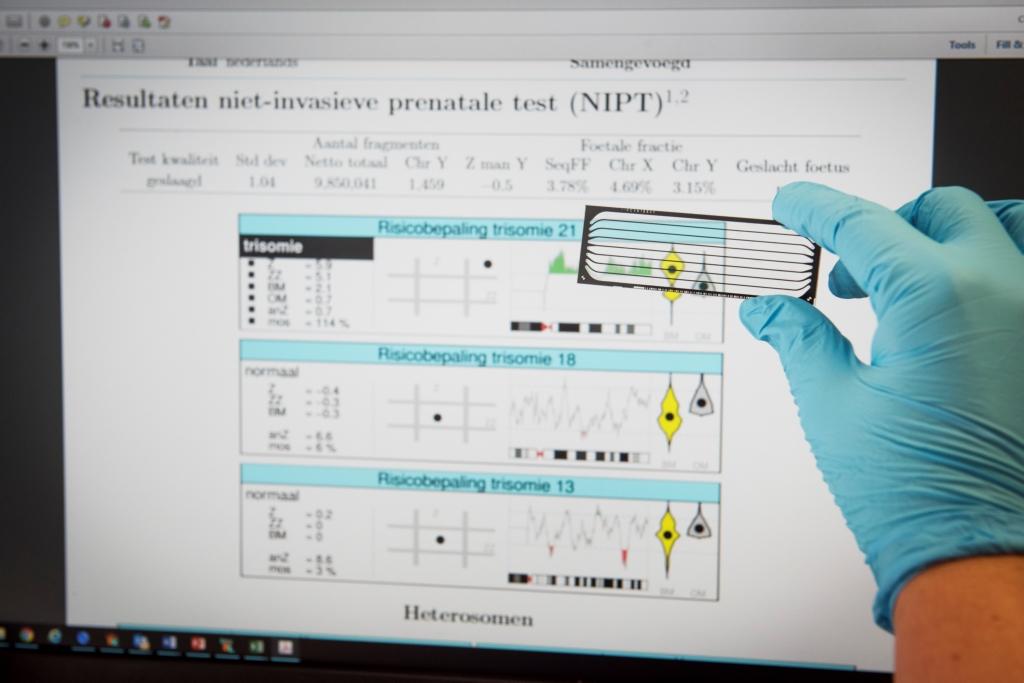Since 1 July 2017 the non-invasive prenatal test (NIPT) is fully reimbursed in Belgium. In the two years following this, in total 188,330 NIPT analyses were performed. Nearly 80 percent of all pregnant women chose to have the test done.
Currently the NIPT is being used worldwide and has all but replaced the classic prenatal combination test. Professor Joris Vermeesch
Professor Joris Vermeesch
Professor Joris Vermeesch of the centre for human genetics at UZ Leuven: “Originally, the NIPT was only used in case of high-risk pregnancies, but today it is being applied worldwide and has all but completely replaced the classic prenatal combination test. Nonetheless, the implementation between countries can vary greatly. Belgium was the first country, and remains one of the few, to fully reimburse the test. Our genetic centres provide a unique framework with a lot of attention to ethical guidelines and genetic counseling which is also reimbursed. And we also check the additional information the test can offer.”
The NIPT is firstly designed to detect trisomy 21, 18 and 13. The trial showed that approximately 1 in 200 pregnancies one of these major disorders was detected. Further analyses showed that the number of false positive and false negative results was extremely limited, which confirms the reliability of the test.
Less invasive tests required
The trial also showed that the number of invasive prenatal tests between 2014 and 2018 were halved as a result of the extensive introduction of the NIPT.
Dr. Lore Lannoo, gynaecologist at UZ Leuven: “Invasive tests such as amniocentesis and CVS tests are now used less frequently for the early detection of genetic disorders. They're only necessary in case of a deviating NIPT result or in case the first ultrasound reveals potential foetal problems. What's moren with the NIPT we can detect some pregnancy complications at an earlier stage. In other ongoing trials we are looking at potentially widening the scope of the NIPT, e.g. to recognise high-risk pregnancies, which would make the test even more cost-efficient for our healthcare system.”
The NIPT enables us to detect some pregnancy complications at an earlier stage. We're examining whether we can widen the scope of the NIPT even further, which would make the test even more cost-efficient. Dr. Lore Lannoo
Dr. Lore Lannoo
Fewer babies with Down syndrome
Lastly the trial also found that in 2018 there were a third less children with Down syndrome (trisomy 21) in comparison to 2014. This is a decrease of 0,06% to 0,04% of all new-borns. This is presumably partly due to the increased sensitivity and wider application of the NIPT the past couple of years.
“A large majority of women for whom the NIPT indicates trisomy 21, chooses to terminate the pregnancy. This obviously remains an ethical matter that should have a place in the social debate. Important is that we offer extensive genetic counseling for every deviating test, to enable parents to make an informed decision for themselves”, professor Vermeesch concludes.
About the NIPT
The non-invasive prenatal test (NIPT) is a genetic screening for a pregnant woman, based on a blood sample that contains the baby's genetic material, in addtion to her own DNA. The test can detect serious genetic disorders as well as the baby's sex, should parents wish to find out. The test can be taken as of the 12th week into the pregnancy.
The NIPT especially aims to detect trisomy – the presence of three rather than two versions – of the chromosome 21, 18 and 13. These are the three main chromosomal abnormalities that can cause serious disorders, including Down syndrome (trisomy 21).
In Belgian genetic centres, the NIPT does not only examine the three chromosomes above but all of the chromosomes (genome-wide testing). As a result the test can also uncover other rare genetic disorders, not only in the baby, but also in the pregnant woman. According to the Belgian bio-ethical guidelines, these ‘additional findings' have to be reported to the mother if they contain clinical relevance. E.g. disorders that could influence the course of the pregnancy, that could cause serious developmentel disorders in the childe, or that have a high risk of disorders in the expectant mother.
